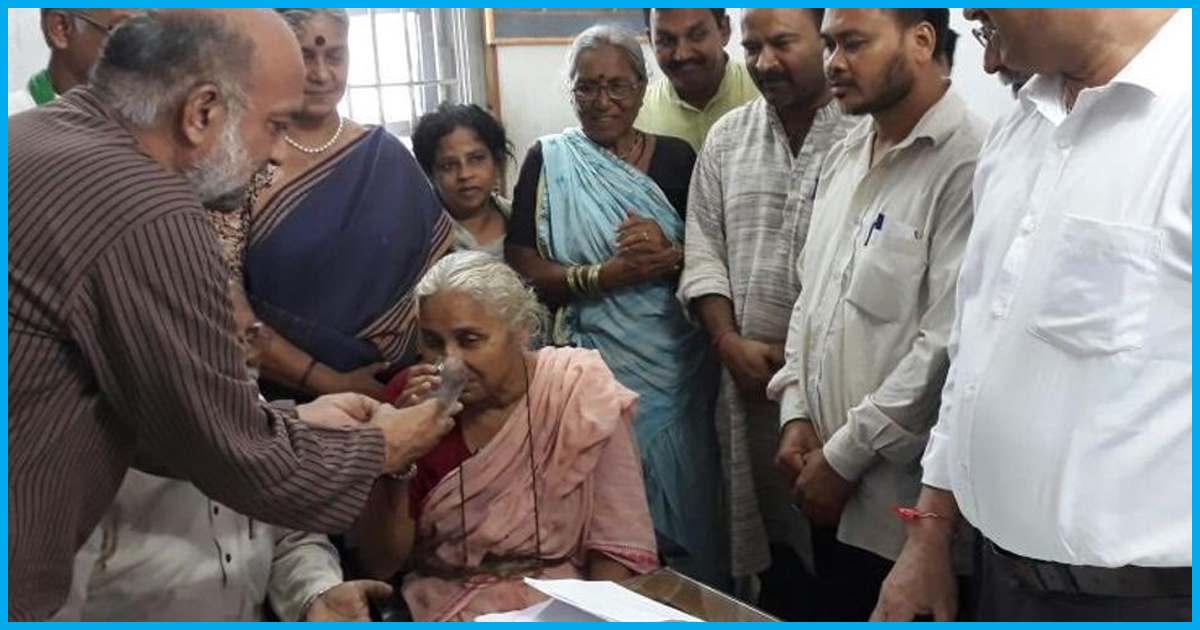
Narmada Bachao Andolan: Activist Medha Patkar Ends 17-Day-Long Fast In Jail
Social activist and Narmada Bachao Andolan (NBA) leader, Medha Patkar broke her 17-day-long fast on 12 August. She was on the fast from 27 July as a sign of protest against the apathy of the government towards the resettlement of those affected by the rise in the height of the Sardar Sarovar Dam.
Patkar broke her fast on the request of several organisations associated with the Narmada Bachao Andolan along with some of the oustees by drinking a glass of lemon juice in Dhar jail, confirmed the prison superintendent Satish Kumar Upadhyay. The protesters had requested their beloved ‘Medha tai’ (Sister Medha) to break the fast thinking about her failing health.
Supreme Court advocate Sanjay Parikh, former West Bengal MP Hanan Mola, National Federation of Indian Women’s Annie Raja, Agriculture Mukti Sangram Samiti’s member Akhil Gogoi, former legislator Sunil Sunilam, senior journalist Chinmaya Mishra, Pramod Bagdi, Saroj Mishra, Meera, etc. were present when she broke the fast.
However, Patkar is still in detention in Dhar jail – she was detained on 9 August, hours after she was released from Bombay Hospital, Indore.
The recent arrest
Patekar was arrested while she was on her way to Chikalda village. She and nine others were picked up by the police on 7 August in an attempt to end the 12-day fast they were observing as a mark of protest against irregularities in the rehabilitation of Sardar Sarovar dam oustees.
She was arrested by the police under Section 151 of CrPC (gives powers to the police to arrest a person without a warrant or orders from the District Magistrate) as the group had tried to reach Chikalda village in spite of the Supreme Court’s order imposing Section 144 of CrPC (Power to issue order in urgent cases of nuisance or apprehended danger) in the area.
Patkar was produced before an SDM court, but she refused to produce surety bond for her bail, following which she was sent to jail. There were other cognizable offences registered against Patkar for the abduction and wrongful confinement of officials and preventing government servants from discharging their duties. These crimes were recorded against her and others at Kukshi police station on 1 August.
The background
Narmada Bachao Andolan (NBA) is a social movement comprising Adivasis, farmers, environmentalists and human rights activists. They have raised their voices against the building of a number of massive dams across the Narmada River, which flows predominately through the states of Gujarat, Madhya Pradesh and Maharashtra. Medha Patkar is the founder of NBA.
The ongoing petition urging the Prime Minister to ensure that the lives of the people of Narmada Valley are safeguarded, demands that the MP government does a comprehensive resurvey of the area and gives priority to rehabilitation first. It further says that farmers, fishermen, artisans, boatmen and shopkeeper should be given sufficient compensation. The environmental loss needs to assessed as well.
The 27 July fast had started as a mark of protest against the government’s decision to increase the height of the dam by 17 metres to 138.72 metres, thus endangering the lives of 40,000 families in Madhya Pradesh living in the catchment area of Sardar Sarovar Dam. These families are facing the danger of submergence if the government carries out the plan.
The Supreme Court had ordered resettlement before 31 July of people of a town and 192 villages that fall in the submerged area, but it has not reached the people yet. Consequently, these families have not moved out of catchment area in MP’s Barwani, Dhar, Alirajpur and Khargone districts.
The Logical Indian community urges the centre and the state to reevaluate its strategies in the Narmada Valley. Development, at the cost of displacement, is never right. India is a country with large-scale displacement – both in rural nature-based communities and poor urban communities. The state and other concerned authorities do not have any right to evict 100-year-old communities without rightful rehabilitation. Article 21 of the Indian Constitution ensures right to life to every citizen of this country, and this needs to be upheld by the government.
 All section
All section













